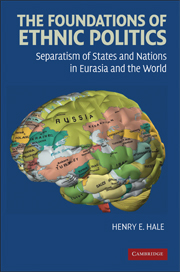Book contents
- Frontmatter
- Contents
- Acknowledgments
- Note on Transliteration
- 1 INTRODUCTION
- Part I Theory with Worldwide Examples
- 2 THE NEED FOR A MICROFOUNDATIONAL THEORY OF ETHNICITY
- 3 A RELATIONAL THEORY: ETHNICITY IS ABOUT UNCERTAINTY, WHEREAS ETHNIC POLITICS IS ABOUT INTERESTS
- 4 A THEORY OF NATIONAL SEPARATISM IN DOMESTIC AND INTERSTATE POLITICS
- Part II Case Comparisons: Separatism in Eurasia
- Part III Conclusion
- Index
- Other Books in the Series
- References
3 - A RELATIONAL THEORY: ETHNICITY IS ABOUT UNCERTAINTY, WHEREAS ETHNIC POLITICS IS ABOUT INTERESTS
Published online by Cambridge University Press: 05 September 2012
- Frontmatter
- Contents
- Acknowledgments
- Note on Transliteration
- 1 INTRODUCTION
- Part I Theory with Worldwide Examples
- 2 THE NEED FOR A MICROFOUNDATIONAL THEORY OF ETHNICITY
- 3 A RELATIONAL THEORY: ETHNICITY IS ABOUT UNCERTAINTY, WHEREAS ETHNIC POLITICS IS ABOUT INTERESTS
- 4 A THEORY OF NATIONAL SEPARATISM IN DOMESTIC AND INTERSTATE POLITICS
- Part II Case Comparisons: Separatism in Eurasia
- Part III Conclusion
- Index
- Other Books in the Series
- References
Summary
The second core argument of this book is that ethnicity is primarily about uncertainty while ethnic politics is mainly about interests. That is, we must begin by distinguishing what drives ethnicity itself as a phenomenon from what drives actual ethnic behavior. This helps us see that the human drive explaining ethnicity itself is uncertainty reduction, which is shown to be distinct from utility maximization – it is not simply a value inserted into the utility equation that people then pursue or maximize. In fact, uncertainty reduction must occur before utility-maximizing behavior is possible. Uncertainty reduction thus ushers us into the realm of actual political behavior, the domain of ethnic politics, which is utility-maximizing behavior. This leads us to several conclusions. For one thing, because reducing uncertainty says nothing about how any resulting certainty will be used, we find new ground for the argument that there are no values inherent in ethnicity at all. But we also find that ethnicity is not epiphenomenal, not a secondary phenomenon. Instead, ethnicity is primary in that it precedes the politics of interest, helping make the pursuit of interest possible. All this is dubbed a “relational theory” of ethnicity for reasons that will become clear later.
This chapter proceeds by recognizing the crucial separation between the motives explaining ethnic identification and the motives explaining the group and individual behavior based on this identification. It begins by examining the former and then turns to the latter before discussing important implications.
- Type
- Chapter
- Information
- The Foundations of Ethnic PoliticsSeparatism of States and Nations in Eurasia and the World, pp. 33 - 56Publisher: Cambridge University PressPrint publication year: 2008



